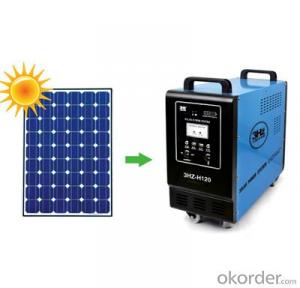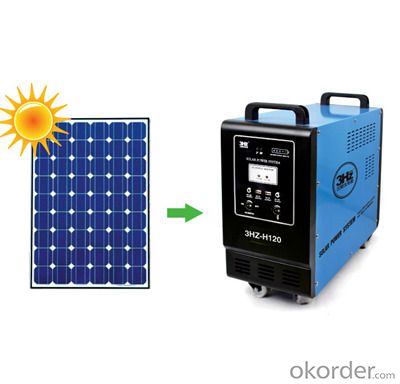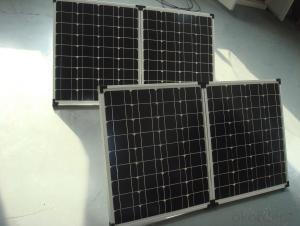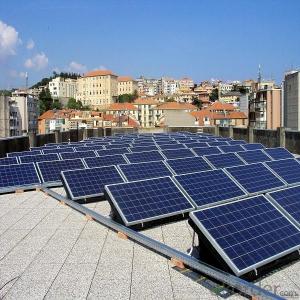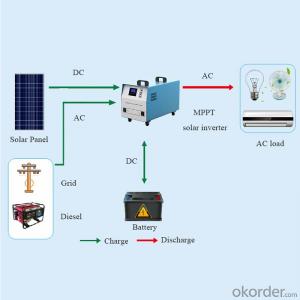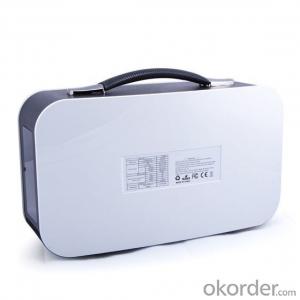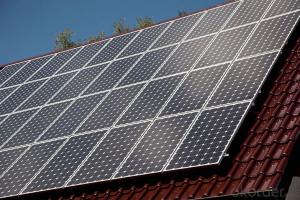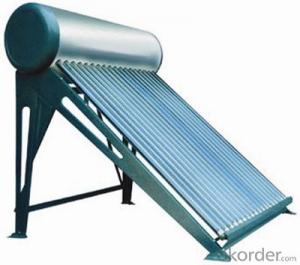150W Cheap Solar Energy Systems Portable Solar Power Generator
- Loading Port:
- China Main Port
- Payment Terms:
- TT OR LC
- Min Order Qty:
- -
- Supply Capability:
- -
OKorder Service Pledge
OKorder Financial Service
You Might Also Like
Specifications
1, 150W Solar Power System.
2, Power rating 300W for home devices.
3, Life span: 15 years.
4, Warranty: 12 months.
150W Solar Power System
1. Functions:
1) This model equipts with high efficiency charge and discharge controlling, over current protection.
2) Direct current output
a. Four plug contacts of DC12V / 20A output, could be used for DC lamp, DC fan, DC refrigerator, etc.
b. With DC9V / 30A and DC5.5V / 500mA output, could be used to charge cell phone, digital camera, music players, etc.
3) Alternating current output
Pure sine wave in 50Hz, continuous power 300W, peak power 600W, could be used to run household appliances like television, computer, fan, icebox, lights, etc.
4) LCD indicator
Showing battery voltage, battery capacity, charging current, inverter working states.
2. System configuration:
1) Poly or mono solar pane: 18V / 150W, 15 years lifespan.
2) Maintenance-free lead-acid batteries can be deep-discharge. 80AH, 12V, three-year lifespan.
3)Pure sine wave inverter. Input: 300W, output: AC 220V / 50Hz.
4) Controller: 12V, 20A
3. User manual:
1) Install the solar panel properly, and connect the solar panel by plug in ‘solar input’on the control box.
2) Operation panel manual
a. Controller’s working states will be showed on the LCD. First line: battery voltage. Second line: charging current. Third line: current battery volume. Fourth line: inverter’s working status.
b. Switch ‘power’ on to start controller, every output outlet works properly.
c. Start AC 220V output by switch ‘inverter’ on, which is fit for AC electrical appliances within 300W. Can be used for most of the digital products through an adapter.
d. It is recommended turning off the back screen light if you don’t need it by press ‘LCD Backlight, this will help to save the power.
4. Notes:
1) Output voltage and current are marked on the panel, overload is prohibited.
2) Keep this product away from rain or water.
3) Charge the battery for 24 hours before the first use, or the product may not work properly for running out of battery during long distance transportation.
3) When you got this product, please fully charge the battery before using. It may not work since over-discharge in long time transportation.
4) To change the battery, please note the battery cable prohibit reverse. Correct wiring should be: the red line connect with the battery anode, black one connects with the battery negative.
5) Please read this manual carefully before using
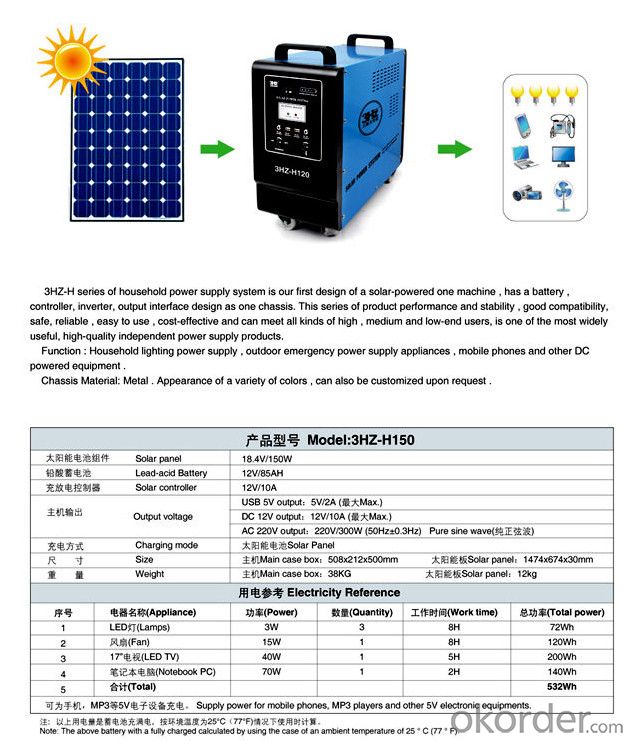
- Q: Can solar energy systems be used for powering electric vehicle testing tracks?
- Yes, solar energy systems can be used for powering electric vehicle testing tracks. Solar panels can be installed alongside the track or on nearby structures to generate electricity. This renewable energy source can then be used to power the charging stations for electric vehicles, providing a sustainable and environmentally friendly solution for testing tracks.
- Q: Can solar energy systems be used in areas with high wind conditions?
- Indeed, areas with high wind conditions can utilize solar energy systems. Although solar energy systems mainly depend on capturing sunlight to produce electricity, they can still operate efficiently in areas with high wind conditions. Solar panels are specifically engineered to endure diverse weather conditions, including strong winds. They are usually securely mounted to withstand the wind's force. Moreover, wind conditions can positively influence solar energy generation. The wind aids in cooling down the solar panels, thereby enhancing their efficiency and overall output. Consequently, areas with high wind conditions can derive advantages from the installation of solar energy systems.
- Q: Can solar energy systems be used in powering community centers or social organizations?
- Yes, solar energy systems can certainly be used to power community centers or social organizations. Solar panels can be installed on the rooftops of these buildings to harness sunlight and convert it into electricity. This renewable energy source can help reduce electricity costs and dependence on traditional energy sources, making it an environmentally friendly and sustainable option for powering community centers and social organizations. Additionally, solar energy systems can also contribute to raising awareness about renewable energy and inspire others in the community to adopt clean energy practices.
- Q: Can solar energy systems be used in areas with limited access to solar inverters?
- Yes, solar energy systems can still be utilized in areas with limited access to solar inverters. In such cases, off-grid solar systems or hybrid systems with battery storage can be implemented. These systems store excess energy generated during the day for use during periods of low or no sunlight, enabling the utilization of solar energy even without continuous access to solar inverters.
- Q: Can solar energy systems be used for powering mining or drilling operations?
- Yes, solar energy systems can be used to power mining or drilling operations. Solar panels can generate electricity in remote locations where it may be challenging or expensive to bring in traditional power sources. This renewable energy source can help reduce the environmental impact of mining and drilling operations by reducing reliance on fossil fuels. Additionally, solar energy systems can provide a reliable and sustainable power supply for these energy-intensive operations.
- Q: What is the role of power purchase agreements in solar energy deployment?
- Power purchase agreements (PPAs) play a crucial role in accelerating the deployment of solar energy. PPAs are contracts between solar developers and electricity buyers, typically utilities or corporations, in which the developer agrees to sell electricity generated from solar installations to the buyer at a predetermined price over a specified period of time. One of the primary benefits of PPAs in solar energy deployment is their ability to mitigate financial risks for both the developer and the buyer. Solar projects often require significant upfront investments, and PPAs help developers secure long-term revenue streams, making it easier to secure financing for the project. On the other hand, buyers benefit from the stable and predictable electricity prices offered by PPAs, reducing their exposure to volatile fossil fuel prices. Furthermore, PPAs provide a mechanism for scaling up solar installations. By entering into long-term contracts, developers can secure a steady income, enabling them to build more solar projects and expand their capacity. This not only increases the overall deployment of solar energy but also helps drive down the costs associated with solar installations due to economies of scale. PPAs also offer flexibility and accessibility. They can be structured in various ways, catering to the unique needs of different parties involved. For instance, a utility may opt for a utility-scale PPA, allowing them to procure a large amount of solar energy to meet their renewable energy targets. On the other hand, a corporation may choose to enter into a distributed PPA, installing solar panels on their own premises and benefiting from reduced electricity costs and a positive sustainability image. Additionally, PPAs contribute to the overall stability and grid integration of solar energy. By signing long-term agreements, solar developers provide a reliable and predictable source of electricity to the grid, assisting utilities in their planning and management of the grid. This helps to balance the intermittency of solar energy and ensures a smooth integration of renewable sources into the existing energy infrastructure. In conclusion, power purchase agreements are vital tools in driving the deployment of solar energy. By reducing financial risks, promoting scalability, offering flexibility, and contributing to grid stability, PPAs incentivize the development and adoption of solar installations, ultimately accelerating the transition towards a cleaner and more sustainable energy future.
- Q: Can solar energy systems be used for powering off-grid military operations?
- Yes, solar energy systems can be effectively used for powering off-grid military operations. Solar panels can generate electricity in remote locations, reducing dependency on traditional fuel sources and ensuring a reliable power supply. This sustainable and renewable energy source helps enhance operational flexibility, reduce logistical challenges, and decrease the environmental impact of military operations. Additionally, solar energy systems can be easily deployed, provide silent operation, and require minimal maintenance, making them suitable for various off-grid military applications.
- Q: How does net metering work?
- Net metering is a billing arrangement that allows solar panel owners to earn credits for excess electricity they generate and feed back into the grid. Essentially, it works by measuring the difference between the electricity a consumer consumes from the grid and the surplus electricity they produce. This surplus is then credited to their account, offsetting their future energy consumption and allowing them to save money on their utility bills.
- Q: Can solar energy systems be installed on mobile homes or RVs?
- Yes, solar energy systems can be installed on mobile homes or RVs. With advancements in technology, portable solar panels and battery systems have become more compact and efficient, making it possible to harness solar energy for these mobile structures. This allows for greater energy independence and the ability to power various appliances and devices while on the move.
- Q: How do solar energy systems affect water conservation?
- Solar energy systems can contribute to water conservation by reducing the need for water-intensive energy sources such as coal or nuclear power. Unlike these traditional energy sources, solar power does not require large amounts of water for cooling or steam generation, thus minimizing the strain on water resources. Additionally, solar panels do not produce any harmful emissions, reducing pollution in water bodies and safeguarding aquatic ecosystems. By transitioning to solar energy systems, we can mitigate water scarcity and promote sustainable water management practices.
Send your message to us
150W Cheap Solar Energy Systems Portable Solar Power Generator
- Loading Port:
- China Main Port
- Payment Terms:
- TT OR LC
- Min Order Qty:
- -
- Supply Capability:
- -
OKorder Service Pledge
OKorder Financial Service
Similar products
Hot products
Hot Searches
Related keywords
